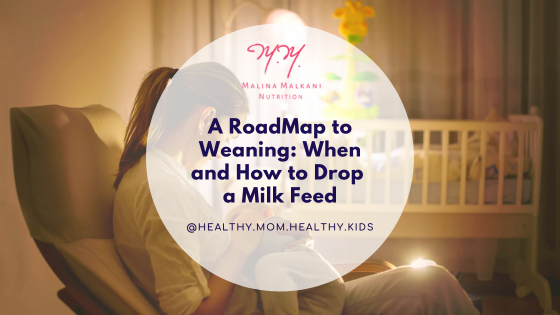How to Wean Night Feedings
This blog contains affiliate links, meaning that if you choose to purchase a product through a link, I will receive a small commission - this does not impact the amount you pay. Affiliate links are marked with an asterisk (*).
“Sleeping through the night” is a milestone that most parents are eager to achieve with their little ones; however, many factors play a role in infant sleep. Milk feedings can be especially soothing for babies, so it can sometimes be challenging to wean from nighttime feedings.
There are many approaches to night weaning, but the important thing to remember is that as long as your baby is at a nutritionally appropriate age, it is up to you to decide when you both are ready and how you would like to approach weaning. As a pediatric registered dietitian specializing in infant and child feeding, my goal here is to provide you with evidence-based information about sleep and night feeding, as well as some helpful tips for making a smooth transition away from feeding at night.
Does my baby need to sleep through the night?
Sleep plays a vital role in infant development; however, most research shows that babies do not need uninterrupted sleep to develop appropriately. What is most important is the number of hours your baby sleeps within a 24-hour period.
According to the American Academy for Sleep Medicine, an infant 4-12 months old needs to sleep 12 to 16 hours per 24 hours. “Sleeping the number of recommended hours on a regular basis is associated with better health outcomes including improved attention, behavior, learning, memory, emotional regulation, quality of life, and mental and physical health.”
With that said, many parents may struggle mentally and physically with their own lack of sleep from feeding their baby throughout the night, making it hard to care for them during the day. In this case, it may be the right time to work on phasing out night feeds.
If the lack of sleep from being woken in the middle of the night has taken a significant toll on your mental health and you are struggling with anxiety or depression, ask for support from friends and family, and please talk with your trusted healthcare professional about getting help.
When can I start night weaning?
Babies wake at night for many reasons throughout infancy. Usually, within the first six months of life, they wake due to hunger, and it is appropriate to feed them on demand during this time. Many babies will begin to drop a night feeding on their own around 3 months old, allowing them to sleep a 6-hour stretch (and sometimes a glorious 8 hours!) at night.
To start night weaning, your baby needs to be getting the nutrients they need for growth and development during the day. Most babies can start dropping night feeds from a nutritional standpoint by about 6 months of age or as soon as they double their birth weight. Once they hit the 6-month mark or get approval from their pediatrician, it is okay to start dropping night feeds and encourage a full 10-12 hours of sleep at night without feedings.
Is it okay to drop night feedings when breastfeeding?
If you are comfortable breastfeeding your baby at night, there is no hurry to wean a breastfed baby unless you are ready. You can also continue successfully breastfeeding throughout the day even if you are ready to start weaning at night.
It is important to note that breastfeeding mothers may notice a slight dip in their daytime milk supply once their baby no longer feeds at night. Some moms find it helpful to pump just before bed or around 9-10 pm to help support their milk supply if they decide to start the night weaning process.
If you still provide your baby multiple lengthy feeds (longer than 5 minutes) throughout the night, your body may not be ready to night wean, and stopping nursing “cold turkey” can be very painful. Your body will still produce milk at the intervals it is accustomed to, and you will likely wake up with engorged, sore breasts, which could lead to an infection called mastitis.
I recommend creating a 1-2 week weaning plan to help prevent mastitis and to encourage continued healthy breastmilk supply: if your baby’s feeding is less than 5 minutes long, you can stop that feeding when you are ready. If the feeding lasts longer than 5 minutes, try reducing the feeding time by 2 minutes every second night.
Tips for Dropping Night Feeds
Be sure your baby is getting plenty of nourishment during the day; if you need help with solids, check out my blog post, “First Foods for Babies” and my Baby Led Weaning course; try to make your baby’s meals well-balanced with iron-rich proteins like salmon and eggs, vitamin C-rich fruits and vegetables like mango and zucchini, and energy-rich foods like these easy blender pancakes
If your baby is active and easily distracted, try offering milk in a quiet, calm setting to allow them time to finish; be sure your baby is getting milk or solid foods about 5-6x per day if they are between 6-12 months
Offer their last feeding of the day at the beginning of their nighttime routine with lights on, and try to resist the urge to let baby fall asleep at bedtime while feeding – this will allow them to practice falling asleep independently once they get in their crib and ultimately will help them fall back asleep without feeding if they wake up at night
If your baby still has multiple feeds at night, start decreasing the amount of milk or length of time nursing during nighttime feeds - plan to decrease by 2 ounces (or 2 minutes if nursing) every second night. Once feeding is at 5 minutes if breastfeeding or 2 ounces of milk in a bottle, you can drop that feeding
If your baby has a hard time sleeping a full 10-12 hours without eating at night, it can sometimes be helpful to offer a “dream feed” about 3 hours after they go to bed (usually around 10-11 pm); be sure to keep the lights dim and allow baby to stay drowsy; some babies do great with this, and others have a hard time falling back asleep, try giving it a few nights in a row to test it out
Try to avoid night weaning during any period of time of illness or significant transitions, such as starting a new daycare or traveling
How long does it take to stop night feedings?
The time it takes to stop night feeding can vary depending on how many times a night your baby feeds, how many feedings you plan to phase out, and how your baby responds. If you prefer to drop feedings “cold turkey,” your baby may adjust quickly in a few nights. It is okay to offer other sources of comfort during this transition, such as a pacifier, patting their back, or rocking. It is also okay to allow your baby time to practice falling back asleep independently.
Can I co-sleep and drop night feedings?
The American Academy of Pediatrics does not recommend co-sleeping in infancy. It is advised to always place your baby on their back in their own bassinet or crib to sleep. If your baby sleeps in a separate bed in your room, it can be challenging to drop night feeds, especially if you are breastfeeding. Babies have a unique ability to sense their parents, and it can sometimes be harder for them to transition to independent sleep and have a good night if they know you are present.
Try putting your baby to sleep in a separate room when you plan to wean at night to help encourage independent sleep. Once you have successfully weaned from night feedings, it is okay to bring them back to your room in a separate bed if that is your preferred sleeping arrangement.
How do I wean my toddler from feeding at night?
Older babies and toddlers may have a more challenging time with a gradual transition away from night feeding because they develop stronger attachments to milk feeds as a source of comfort as they age. Consider dropping night feeding quickly, either cold turkey or over 1-3 nights.
While it is important not to give any bottles of milk in bed to prevent the risk of baby bottle tooth decay, it is okay to offer an alternative source of comfort, such as a pacifier, blanket, or teddy bear (if over 12 months of age).
Reading developmentally appropriate books together about the weaning process can help toddlers feel validated and understood. Books can also ease the transition of weaning by giving them language they can use to define their feelings about it. On another level, reading books together provides moments of connection and comfort that are often exactly what toddlers are seeking through nursing. Here is a list of my favorite toddler-weaning books*.
If you’re interested in learning more about how and when to integrate foods into your baby's diet, as well as how to reduce the risk of food allergies during infancy, check out my new baby-led feeding cookbook!
Further, if you're looking for personalized nutrition support for your babies or kids, I am currently accepting new clients in my virtual private practice. Please comment below with any questions. Thanks for reading!








